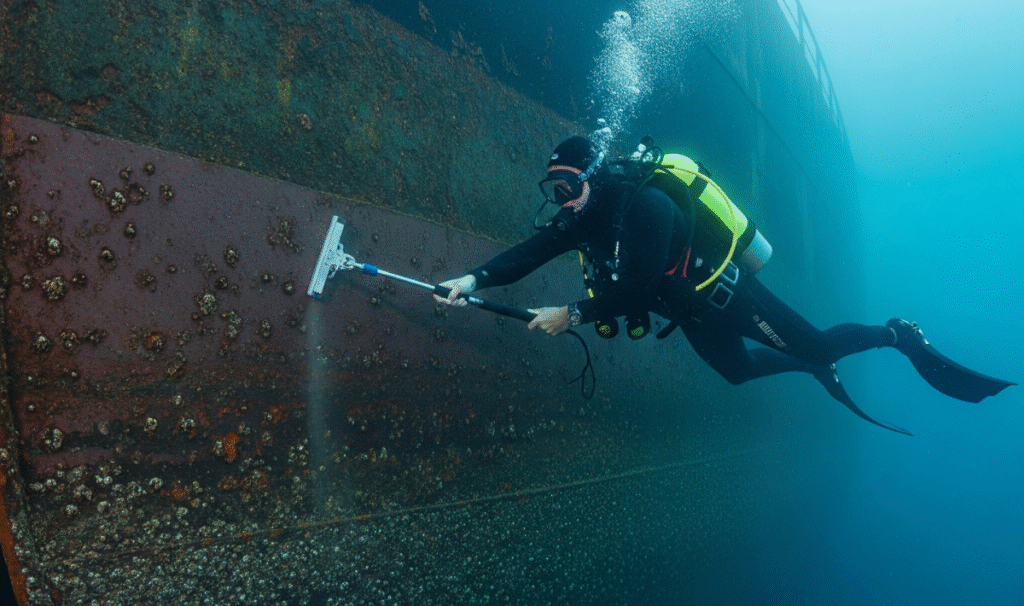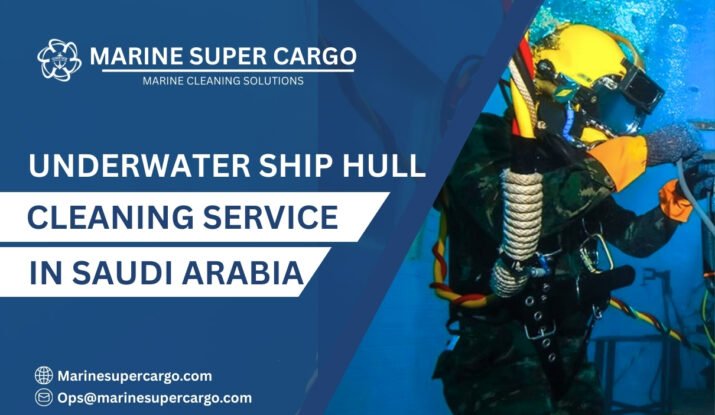Saudi Arabia’s name may conjure images of vast deserts, oil reserves, and modern skylines, but it is also a maritime giant. With critical ports like Jeddah Islamic Port on the Red Sea and King Abdulaziz Port on the Arabian Gulf, Saudi Arabia is situated at the crossroads of some of the world’s busiest trade routes.
Every massive tanker and container ship docking here faces an invisible enemy below the waves: biofouling. Marine growth—barnacles, algae, seaweed—clings to hulls, slowing vessels, driving up fuel consumption, and risking safety. The answer? Underwater ship hull cleaning in Saudi Arabia.
It may seem like a hidden task under the waterline, but it delivers massive benefits to efficiency, safety, and environmental responsibility. Let’s explore underwater ship hull cleaning in Saudi Arabia and why this practice is crucial to global trade that flows through the Kingdom’s waters.
What is Underwater Ship Hull Cleaning in Saudi Arabia?
Imagine trying to run a race wearing heavy boots caked with mud. That’s what a ship faces when fouling piles up beneath its hull.
Underwater ship hull cleaning in Saudi Arabia involves specialized divers or robotic equipment removing this marine growth with brushes, scrapers, or suction systems. The goal? Restore a ship’s smooth profile so it sails as effectively as it was designed to. This cleaning isn’t cosmetic—it’s a vital service tied to costs, fleet safety, and environmental care.
Understanding the Drag Effect of Biofouling
Even a thin layer of algae creates drag. Add barnacles and slime to the mix, and suddenly, engines have to work overtime. Fuel consumption spikes sharply. Industry studies report fouling can crank up fuel use by 30–40%. That’s like paying for four barrels of oil when you only need three.

Lower Fuel Costs and Enhanced Performance
Regular underwater ship hull cleaning in Saudi Arabia shaves off these inefficiencies. A clean hull cuts drag, allowing vessels to travel faster with less fuel. The results are almost immediate: lower operational costs, smoother voyages, and savings that often cover cleaning expenses within a few trips.
Preventing Corrosion and Protecting Hull Integrity
Marine fouling doesn’t just hurt performance—it corrodes steel. Algae and organisms trap salty water against protective coatings, eroding hull materials. Left unchecked, ships risk structural damage, reducing their integrity and shortening their lifespan.
By investing in underwater ship hull cleaning in Saudi Arabia, shipowners proactively protect hull coatings, extend vessel longevity, and maintain seaworthiness across decades.
Ensuring Compliance with International Standards
The International Maritime Organization (IMO) and MARPOL restrictions oblige ships to maintain safe, clean, and efficient hulls. Failing inspections can lead to fines, restrictions, or even delays at Saudi ports.
With professional underwater ship hull cleaning in Saudi Arabia, operators stay in line with regulations and pass inspections without costly hiccups.
Reducing Greenhouse Gas Emissions
Less drag equals less fuel. Less fuel equals fewer emissions. According to imo.org, shipping produces around 3% of the world’s CO₂ emissions. Regular cleaning offers a direct path to reduction, supporting Saudi Arabia’s commitment to energy transition and global climate goals.
Preventing Invasive Marine Species
Marine life can easily hitch rides across oceans, creating invasive species problems. The MARPOL Convention underscores the risks: transported organisms disrupt ecosystems, often irreversibly.
Regular underwater ship hull cleaning in Saudi Arabia prevents these stowaways from spreading into the Red Sea and Arabian Gulf, protecting fragile marine ecosystems unique to the region.
Strategic Trade Location: Red Sea and Arabian Gulf
Saudi Arabia sits astride two globally vital maritime highways: the Red Sea route connecting to the Suez Canal and the Gulf route linking to Asia. Ports here are natural pauses for cleaning operations. Conducting underwater ship hull cleaning in Saudi Arabia while docked optimizes both time and cost for busy fleets.
Modern Infrastructure and Expertise
Ports in Saudi Arabia are some of the Middle East’s most advanced. With guidance from imca-int.com and iaphworldports.org, local marine services use trained divers, robotics, and eco-technologies to deliver world-class hull services for international clients.
Step-by-Step Procedure
- Inspection – Divers or ROVs survey hull fouling levels.
- Removal – Marine growth is scraped or brushed using controlled tools.
- Polishing – Surfaces are smoothed for maximum hydrodynamic efficiency.
- Debris Capture – Fouling waste is managed to avoid impacting sea life.
- Reporting – Maintenance and compliance reports provided to operators.
Tools and Technologies Used in Saudi Arabia
Modern underwater ship hull cleaning in Saudi Arabia employs suction filtration tools, robotic cleaners, and eco-brush systems. These not only boost efficiency but also reduce risks for divers and marine environments.
Challenges of Hull Cleaning in the Region
Fouling in Warm and Salty Seas
The Arabian Gulf and Red Sea have warm, nutrient-rich waters—perfect conditions for biofouling. Ships stationed here face faster fouling rates than vessels in colder seas, making frequent cleaning essential.
Balancing Maintenance Costs and Downtime
Clean too often, and protective coatings may wear down prematurely. Waiting too long and fouling drives up costs with wasted fuel. Industry experts recommend underwater ship hull cleaning in Saudi Arabia every 6–12 months to strike the right balance.

The Future of Hull Cleaning in Saudi Arabia
Eco-Friendly Innovations
The future points toward sustainable methods: biocide-free antifouling coatings, closed-loop filtration systems, and greener cleaning brushes. Saudi Arabia, with its international commitments, is evolving into a hub for these eco-friendly advancements.
AI and Robotics Shaping the Future
Picture AI-driven sensors continuously monitoring hull drag and robotic vehicles ready to perform cleaning at precise intervals. These innovations are already on the horizon, and Saudi ports are preparing to be at the forefront of digital maritime maintenance with underwater ship hull cleaning in Saudi Arabia.
Conclusion
The sea might seem forgiving, but beneath the waterline, neglect can cost dearly. Hidden biofouling raises expenses, risks safety, and harms ecosystems.
The 3 key benefits of underwater ship hull cleaning in Saudi Arabia are:
- Improved fuel efficiency and reduced costs.
- Stronger vessel safety and extended lifespan.
- Environmental protection, emission cuts, and biodiversity safeguards.
For ships traversing the Red Sea and Gulf, scheduling hull cleaning in Saudi Arabia isn’t just smart—it’s an essential investment for efficient, safe, and sustainable shipping. Partnering with CleanShip.co ensures top-tier, eco-friendly maintenance every time.
FAQ:
Q1. How often should hull cleaning be scheduled in Saudi Arabia?
Every 6–12 months, with more frequent cleaning recommended for ships lingering in warm Gulf waters.
Q2. Does underwater hull cleaning damage protective coatings?
Not with modern eco-friendly techniques—it preserves coatings while removing growth.
Q3. Can hull cleaning really save money?
Absolutely. Reduced drag lowers fuel usage, translating into significant cost savings over multiple voyages.
Q4. Why is Saudi Arabia ideal for hull cleaning?
Its strategic ports, advanced infrastructure, and skilled workforce make underwater ship hull cleaning in Saudi Arabia efficient and cost-effective.
Q5. How does hull cleaning protect the environment?
It reduces excess fuel emissions and prevents invasive species from entering the Red Sea and Gulf ecosystems.


